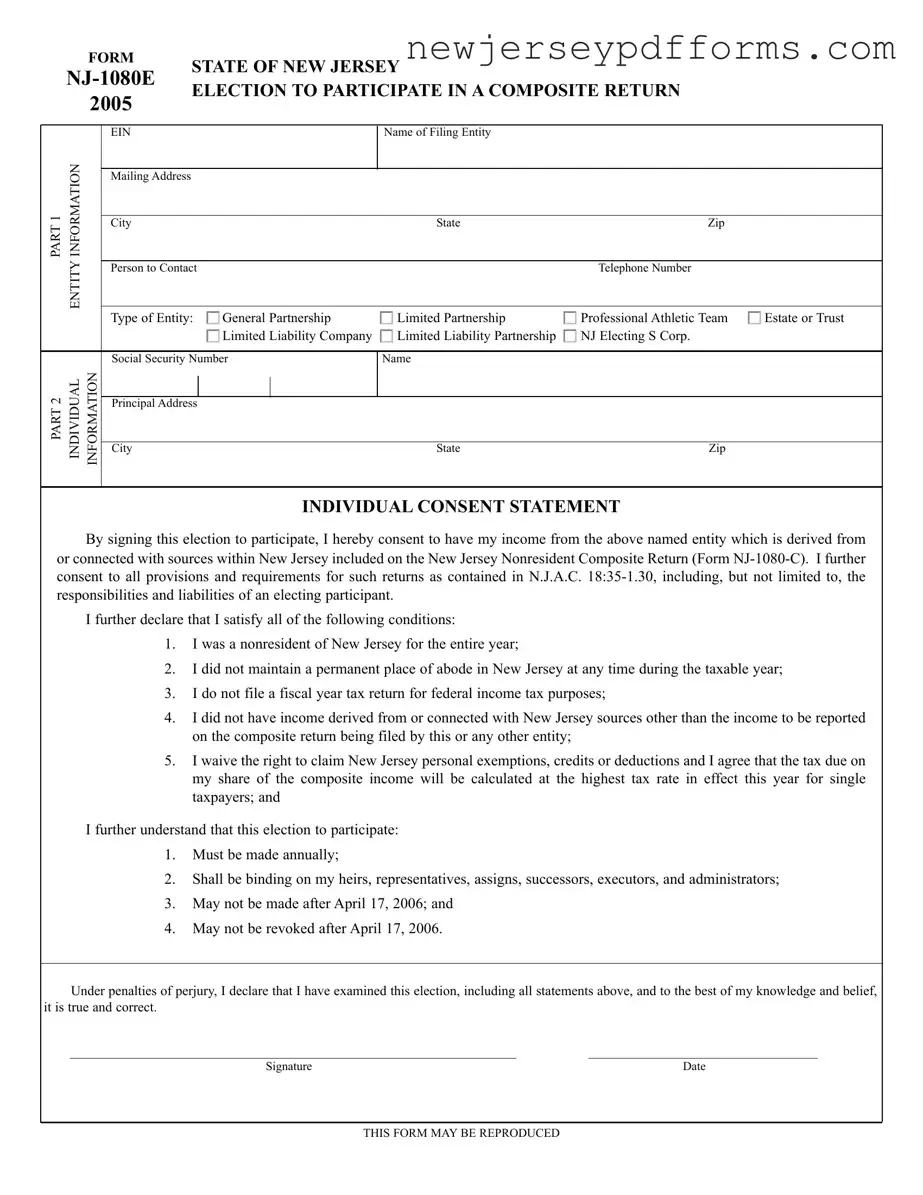The NJ-1040NR form is the Nonresident New Jersey Gross Income Tax Return. It is similar to the NJ-1080E form in that both are used by individuals who earn income connected to New Jersey but do not reside in the state. While the NJ-1080E allows nonresidents to elect to participate in a composite return filed by an entity, the NJ-1040NR is for individuals who do not participate in such a return and must report all income from New Jersey sources. Both forms require personal information, including Social Security numbers and income details, but the NJ-1040NR is more comprehensive in capturing all income sources, not just those related to a specific entity.
Understanding the intricacies of the Power of Attorney form can be highly beneficial, particularly for those navigating legal documentation and ensuring decisions align with their intentions even when they cannot act directly. For those seeking a reliable template to create such a document, resources like PDF Document Service can provide essential guidance and support in drafting a thorough and legally sound Power of Attorney form.
The NJ-1065 form serves as the Partnership Return for New Jersey Income Tax. This document is similar to the NJ-1080E in that it is filed by partnerships, which can include nonresident partners. The NJ-1065 outlines the income, deductions, and credits of the partnership and provides a Schedule NJK-1 for each partner. Like the NJ-1080E, it facilitates the reporting of income derived from New Jersey sources, although the NJ-1065 is focused on the entity level while the NJ-1080E pertains to individual elections to be included in a composite return.
The NJ-1065S form is the New Jersey S Corporation Return. This document is similar to the NJ-1080E in that it allows S corporations to report income while providing information for shareholders, including nonresidents. Each shareholder receives a Schedule NJ-K-1, which details their share of income. The NJ-1065S captures the income of the S corporation, while the NJ-1080E allows individuals to consent to have their income reported on a composite return, emphasizing the collaborative nature of tax reporting for nonresidents.
The NJ-1040 form is the standard New Jersey Resident Income Tax Return. It shares similarities with the NJ-1080E in that both forms require individuals to report income and calculate tax liabilities. However, the NJ-1040 is specifically for residents, while the NJ-1080E is for nonresidents electing to participate in a composite return. Both forms require personal identification and income details, but the NJ-1040 allows for exemptions and deductions that are not available to participants of the NJ-1080E.
The NJ-630 form is the Application for Extension of Time to File New Jersey Income Tax Returns. This document is similar to the NJ-1080E in that it can be used by entities that are filing composite returns. While the NJ-630 allows for an extension of time to file, the NJ-1080E is focused on the election to participate in a composite return. Both forms are essential for ensuring compliance with New Jersey tax obligations, particularly for those involved in partnerships or corporate entities.
The W-2 form, Wage and Tax Statement, is another relevant document. It is similar to the NJ-1080E in that it reports income earned by individuals, including nonresidents. Employers provide W-2 forms to employees, detailing wages and taxes withheld. While the NJ-1080E allows individuals to consent to have their income included in a composite return, the W-2 serves as a record of earned income that may also be reported on various tax forms, including the NJ-1040NR or NJ-1080-C.
The K-1 form, which is used for partnerships and S corporations, also has similarities with the NJ-1080E. Each partner or shareholder receives a K-1 that reports their share of income, deductions, and credits from the entity. While the NJ-1080E is used by nonresidents to elect to participate in a composite return, the K-1 provides the necessary information for individuals to report their income from partnerships or S corporations on their tax returns, including the NJ-1040NR.
The NJ-1040ES form is the Estimated Tax Payment Voucher for Individuals. This document is similar to the NJ-1080E in that it is utilized by individuals who may owe taxes on income derived from New Jersey sources. While the NJ-1080E allows for participation in a composite return, the NJ-1040ES is focused on making estimated tax payments to avoid penalties. Both forms are essential for individuals managing their tax responsibilities in relation to New Jersey income.
The NJ-PTA form, or Property Tax Reimbursement Application, is another document that shares some similarities with the NJ-1080E. While primarily aimed at homeowners and renters seeking reimbursement for property taxes, it also requires individuals to report income. The NJ-1080E focuses on nonresident income derived from specific entities, while the NJ-PTA addresses property tax relief for eligible individuals, highlighting different aspects of New Jersey tax obligations.

